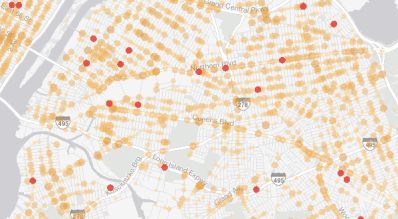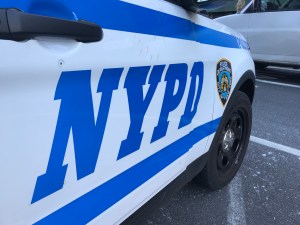Doctors Relate the Horror of Traffic Violence at Pedestrian Injury Summit
Medical professionals and transportation experts convened Thursday for the third New York City Summit on Pedestrian Injury, hosted by Elmhurst Hospital. The day-long event brought transportation officials and advocates together with doctors who witness the destruction caused by reckless drivers in the city every day.

The summit is chaired by Dr. Jamie Ullman, director of neurosurgery at Elmhurst, and Anju Galer, trauma coordinator for the hospital’s departments of surgery and nursing. Elmhurst is in year two of a three-year pedestrian and cyclist injury study. Ullman said 2012 marked an all-time high in the number of injuries within the hospital catchment area, and in 2013, she said, it’s a trend that shows “no signs of stopping.”
Dr. Kaushal Shah is the principal investigator for the study. Shah noted that media reports usually offer only the barest details of what happens in a traffic crash. To illustrate, he showed a slide of a recent story that reduced the deaths of two pedestrians to one short paragraph.
When a person is struck by a motorist, said Shah, it is “the worst day of their life.” For example, the first child hit by curb-jumping driver Francis Aung Lu in Maspeth in September was in the operating room for 10 hours, Shah said. Senior Cui Ju Yu, struck by a hit-and-run driver in Corona two weeks later, died from a brain hematoma*.
Most adult pedestrians who die are killed due to trauma to the head and neck, said Dr. George Agriantonis, director of trauma at Elmhurst. Injuries to the lower extremities often lead to significant disability. Flipping through slides of x-rayed and photographed images of grievous injuries, Agriantonis said compound fractures of the legs and shattered pelvises are common.
Injury patterns depend on the speed and type of vehicle, Agriantonis said. When an adult is struck by a passenger vehicle, there are usually three incidents of impact. The front of the vehicle hits the legs, which throws the victim onto the hood and windshield. The third impact occurs when the victim falls off the vehicle and hits the pavement or sidewalk.
Small children take the brunt of a collision to the torso and pelvis. Rather than being whipped onto the hood, said Agriantonis, because of their height children are thrown forward, and remain in the path of the vehicle.
Shah said researchers are seeing an increase in sidewalk crashes. Said Ullman: “I don’t know why these people are driving on the sidewalk.”
The Elmhurst catchment area is populated by 1.5 million people, Ullman said. Pedestrians hit by drivers were the leading injury category of emergency patients at Elmhurst from 2000 to 2009, and at 296, the number of pedestrians and cyclists admitted in 2012 was the hospital’s highest ever.
Ullman noted that the number of people admitted does not count victims who die at the scene, and is smaller than the total number of people who suffer injuries. One injury can severely disrupt a victim’s life, said Ullman. “One minute you’re working,” she said, “the next minute you’re in the hospital and out of the work force.”
Ullman said Queens Boulevard in particular is “a problem” for Elmhurst and Jamaica Hospitals. Dr. Sebastian Schubl, trauma services director at Jamaica, said 11 percent of injured pedestrians and cyclists admitted there die. Over the last three months, 80 injured pedestrians and cyclists were admitted. The rate of chronic injury and death seems to be rising, Schubl said, with 2013 so far having “the highest mortality rate we’ve ever seen.”
“I don’t know what’s causing it,” said Schubl. “I just know people are dying at my hospital, and I don’t like it.”
Elmhurst Hospital sees more pedestrian injuries, percentage-wise, than other city hospitals, said Dr. Imran Ali, a neurosurgeon at Elmhurst and researcher on the hospital’s injury study. Through September 2013, 798 patients were interviewed for the study. Thirty percent were under age 18. The study period will conclude in September 2014. Ali said conclusions will point to engineering measures, including pedestrian medians and longer crossing times, that make streets safer. He also suggested equipping seniors with RFID devices to give them traffic signal priority, along the lines of Select Bus Service buses.
Ali is one of several doctors who wear a pager that emits a loud beep when a pedestrian or cyclist is admitted to the Elmhurst emergency room. The pagers went off three times during the summit. One of the victims was an 81-year-old man, hit by a livery cab driver at Roosevelt Avenue and Case Street. Roosevelt Avenue was mentioned several times Thursday as a locus of pedestrian and cyclist injuries.
Council Member Danny Dromm, the only council member in attendance, said constituents are happy with the East Elmhurst Slow Zone. Data on speeding is not yet available, Dromm said, but the perception is that motorists generally seem to be driving more slowly. A second Slow Zone was approved for Dromm’s district and is scheduled to be installed next year. After the deaths of three local children, Dromm noted, parents and others have mobilized to push for safer streets.
Dromm has allocated $300,000 for Safe Routes to School in his district. He said Queens Boulevard needs protected bike lanes to improve safety for cyclists and pedestrians, and called Northern Boulevard “another boulevard of death.” Dromm said negative stories in the New York Times about new pedestrian spaces have not helped the effort to make it safer to walk and bike.
Ullman asked Dromm if he could compel NYPD to enforce speed limits in the area. Dromm replied that it is “very difficult to get the police department to take this seriously.” An NYPD official scheduled to speak at the summit did not show up.
We’ll have more on the summit in future posts.
* No patient names or other identifying information was shared at the summit. Because we are familiar with individual traffic crashes, Streetsblog was able to identify the victims through published news photos of crash scenes, which were shown on slides.


